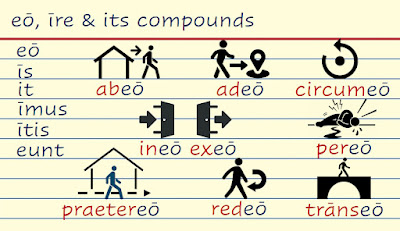If you learned French as a non-native speaker you may remember with rolling eyes the term “irregular verbs” i.e. those verbs which do not follow the usual conjugation pattern, and the irregularities of which can appear completely random: je fais, tu fais, il fait, nous faisons, vous faites, ils font. Latin is much kinder because it has very few irregular verbs and those verbs which are classified as irregular are far less “shots in the dark” than irregular verbs in other languages. You already know one:
esse: to be; no, there is no way of
working out how that verb is conjugated based upon its infinitive alone, but
the personal endings remain clearly marked:
- sum [/m/ is
also a personal ending referring to the first person singular ‘I’; it does
not appear often in the present tense, but it does occur in other tenses]
- es
- est
- sumus
- estis
- sunt
The irregular verb introduced in
the previous unit on daily routine is eō, īre: to go [mark as
irregular: irr.]:
- eō: I go
- īs: you (sg.) go
- it: he / she /
it goes
- īmus: we go
- ītis: you (pl.)
go
- eunt: they go
compound verbs
a compound verb is one that is made of two or more parts e.g. over¦eat, black¦mail, under¦estimate etc. In Latin, compound verbs are often created with prefixes, many of which also function as prepositions. With eō, īre you can add prefixes that, in fact, you aready know as prepositions. Here are a few examples although other compounds with eō exist.
ā / ab [(away) from] > ab¦eō, abīre: go away; depart
ad [towards] > ad¦eō, adīre: go to; approach
circum [around] > circum¦eō, circumīre: go around; surround
ē / ex [out of] > ex¦eō, exīre: go out
in [in(to) > on] in¦eō, inīre: go into
trāns [across] > trāns¦eō, trānsīre: go across
The prefix re- in English in, for example, reread and renew is derived from Latin re(d)- with the same original idea of ‘again’ or ‘back’: redeō, redīre: go back; return
Another commonly found example is: praeter (preposition + accusative): past > praeter¦eō, praeterīre: go past
The slightly odd one is per¦eō, perīre, using the preposition per (through) as a prefix: its meaning is ‘to perish; pass away; die’
You might want to remember this
Mediaeval line:
Novus, novus amor est quō pereō!
It’s a new, new love by which I
perish!
A word of advice / warning:
Latin verbs can have multiple meanings which, while still rooted in the basic
sense of the verb, are used to convey many abstract concepts e.g.
domum inīre: to go into a house, but bellum
inīre (begin a war), consilium inīre (take a
resolution)
You can fall into the trap of becoming too involved in what can be lists of definitions. When reading Latin, the best approach is to look at the use of a word in context (many good publications will provide notes) while bearing in mind the root meaning of the word.




No comments:
Post a Comment